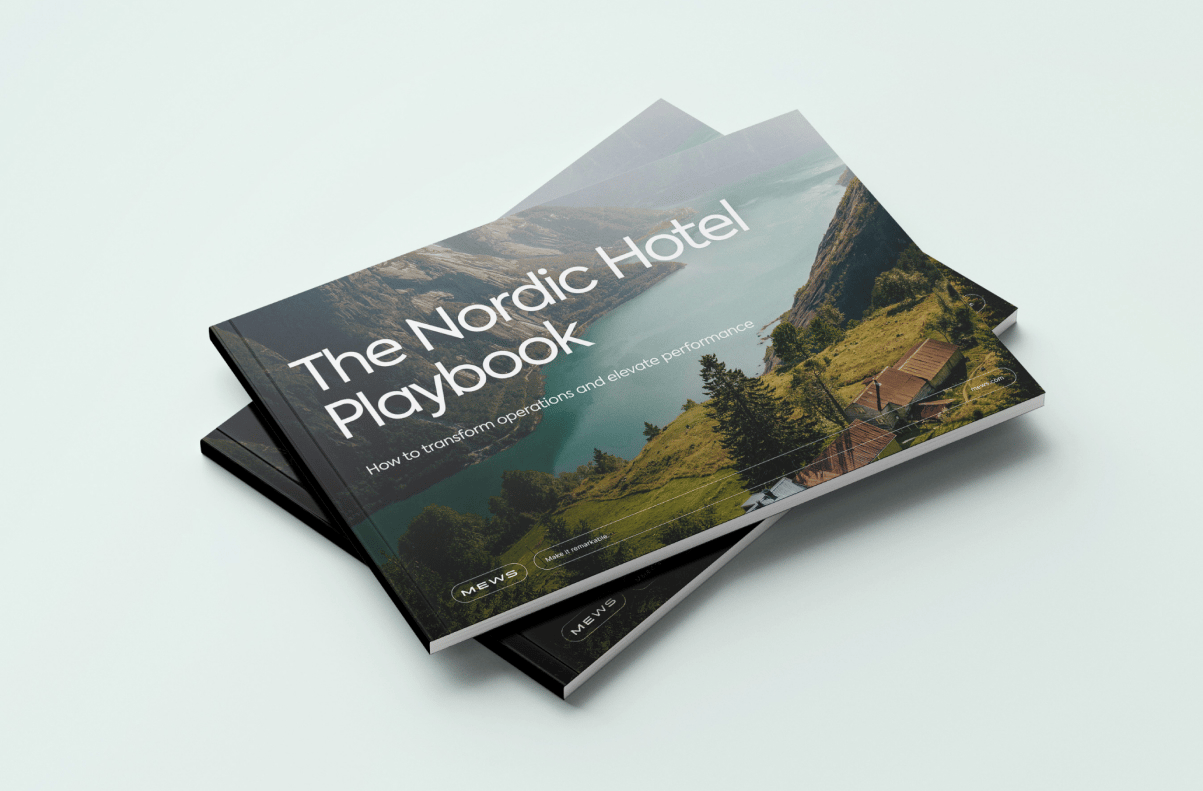At Mews, curiosity is one of our five company values (we are also ambitious, resilient, open, and human, since you asked). No area of our day-to-day life better represents our curiosity than the #all-reading channel on Slack. With 850 members, it’s one of the most popular channels in the company.
Every day, people from different departments, backgrounds and parts of the world share fascinating books, articles and podcasts about hospitality, tech, science, business, history... Anything that flicked a switch in their brain. This invariably kicks off a conversation about the topics raised and then our collective curiosity is in full flow.
In my years with Mews, I’ve discovered countless great things in this channel – and I shared many resources I found interesting and potentially beneficial for my colleagues. Recently, several of Mews' customers and prospects, and even individuals considering a job in our company, asked which books or resources on hospitality and innovation I would recommend.
So, I compiled this list. All these books, articles, and podcasts resonated within our reading group, and many of them influenced our product in one way or another. I hope you find the list useful, and that it opens new perspectives and triggers new ideas – just as they did for us.
Table of contents
The best tech and hospitality books
Unreasonable Hospitality by Will Guidara
Category: Hospitality
This book is an absolute must-read for anyone building a successful business. Will Guidara, the former general manager of Eleven Madison Park, one of the best restaurants in the world, explores ‘unreasonable hospitality’, an approach that involves going beyond typical customer care to provide a uniquely tailored and VIP-like experience. Rather than meeting expectations, it seeks to exceed them, creating unforgettable moments that leave a lasting impression.
The essence of unreasonable hospitality lies in the smallest details that make customers feel special. It's about personalized gestures, such as a server offering an off-menu dessert or a hotel manager going out of their way to retrieve a forgotten shopping bag. These moments, beyond the expected, define the nature of unreasonable hospitality and remain in people's memories.
This concept is not exclusive to high-end dining; it can be applied across various service-based industries, from retail to healthcare. By consistently exceeding customer expectations, businesses can build a loyal customer base of advocates, contributing to a significant boost in the bottom line.
Key takeaways:
- Unreasonable hospitality creates tailor-made experiences, exceeding expectations and leaving a lasting impression.
- It's applicable to any service-based business, fostering customer loyalty and boosting profitability.
Build: An Unorthodox Guide to Making Things Worth Making by Tony Fadell
Category: product development
Build by Tony Fadell serves as a comprehensive advice encyclopedia, offering mentorship in a book for individuals at all career stages, from recent graduates to CEOs.
Fadell draws from over 30 years of experience in Silicon Valley, including his roles in creating iconic products like the iPod, iPhone, and Nest Learning Thermostat. Through personal stories, practical advice, and captivating insights, Fadell shares valuable lessons on leadership, design, startups, decision-making, and mentorship. His unorthodox yet effective approach emphasizes learning from past successes and failures, highlighting the importance of human nature and the value of continuous improvement in both leadership and product development.
This is a true product management bible in which Fadell describes how to identify the right problems to solve (the “pain” and the “painkiller”). That is exactly how Mews product teams operate. This book is a must-read for everyone building their own business or launching a new product within a larger organization.
Key takeaways:
- The book offers comprehensive advice from a Silicon Valley matador.
- Fadell shares insights on leadership, design, startups, decision-making and mentorship.
- Recommended for anyone building a business or launching a new product.
Working Backwards by Bill Carr & Colin Bryar
Category: product development, business strategy, innovation
Working Backwards by Bill Carr and Colin Bryar (former Amazon execs) offers a firsthand account of Amazon's inner workings. It provides valuable insights into the customer-centric approach, decision-making processes, and leadership principles fueling Amazon's success.
Some of the topics discussed in the book clearly stand out. The authors describe in detail the trademark method of product narratives which replaced PowerPoint presentations in Amazon. They explain the bar-raiser concept for hiring where each new team member brings a quality or a skill that was previously missing in that team – a simple, yet extremely powerful way to build a strong organization.
And you’ll learn that huge things such as Prime or AWS can start from small seeds and the key to success is not just a focus on customers, but also a willingness to build products over a long time if you clearly see the future opportunity. If you want to learn more about the book and the methods used at Amazon, check out this great interview with the authors on the a16z Podcast.
Key takeaways:
- The book provides insights into Amazon's customer-centric approach, decision-making processes and leadership principles.
- Highlights include Amazon's use of product narratives, the bar-raiser concept for hiring, and the importance of long-term focus on opportunities.
- Recommended for those interested in learning about Amazon's inner workings and management strategies.
Four Seasons: The Story of a Business Philosophy by Isadore Sharp
Category: hospitality
Isadore Sharp, founder of Four Seasons Hotels and Resorts, narrates the story of his journey and the business philosophy shaping the renowned luxury brand. The book provides insights into building a customer-centric business and maintaining service excellence.
Sharp explains that no matter how great a hotel company’s vision, how many skilled managers it has or how much it spent on design and build, the responsibility for providing great service always belongs to the front-line workers – those directly interacting with the guests.
To quote: "No one in a central office could ensure good service. The outcome in our industry normally depends on the front-line employees – doormen, waiters, housekeepers. These front-line staff represent our product to our customers. In the most realistic sense, they are the product."
We always keep this in mind while designing new functionalities in Mews. They must be intuitive, easy-to-use, and allow the frontline workers to fully focus on their interaction with the guests. In other words,user disengagement is the key.
Key takeaways:
- Isadore Sharp shares his journey and business philosophy behind Four Seasons Hotels and Resorts.
- The book emphasizes building a customer-centric business and maintaining service excellence.
- This book is a must-read for everyone starting a new hospitality brand.
Loonshots: How to Nurture the Crazy Ideas That Win Wars, Cure Diseases, and Transform Industries by Safi Bahcall
Category: business strategy, innovation, history
When published in 2019, this book became an instant bestseller – named a business book of the year by FT, Bloomberg, Forbes and more – and had a profound impact on Mews product organization.
Safi Bahcall examines the challenges that innovators face, emphasizing the balance between nurturing creative ideas (loonshots) and maintaining the stability of an organization. Drawing on historical examples and scientific insights, the book provides a framework for understanding how to foster innovation and drive positive change within both small startups and large corporations.
Sticking to the recommendations outlined in this book allowed us to build industry-changing innovations such as Marketplace, Payments or Mews Spaces.
Key takeaways:
- Loonshots explores the concept of fostering innovation within organizations.
- The book offers insights on balancing creativity and structure to drive breakthrough innovations and organizational success.
- Particularly interesting for established companies that want to maintain agility and the ability to innovate.
Rethinking Real Estate: A Roadmap to Technology’s Impact on the World’s Largest Asset Class by Dror Poleg
Category: innovation, tech, real estate
Having been part of the hotel industry for more than a decade, Mews has witnessed first-hand the turbulent changes technology is driving, not just in hospitality, but also in housing, workplaces and retail.
Rethinking Real Estate summarizes the transformative impact of technology on the real estate industry, from design and operations to valuation. The book argues that technology – apps for co-living, flexible working, home rentals, and innovative use of physical spaces – is democratizing access to capital and information, reshaping tenant behaviors, and challenging regulatory power.
It explores the shift in value away from the assets themselves towards those who understand the needs of specific end-users and who can use technology to deliver comprehensive, on-demand solutions. Companies like Airbnb, OYO, and Zillow represent this change. The book is a valuable resource for a broad spectrum of real estate professionals, and it provided many useful insights to our team working on Mews Spaces.
Key takeaways:
- Technology is redefining the value of physical space, the meaning of location and accessibility, the power of zoning and regulation, and the flow of capital and information.
- The book equips technology entrepreneurs and real estate professionals with insights and strategies for innovation, risk assessment and competitor evaluation.
Chip War: The Fight for the World's Most Critical Technology by Chris Miller
Category: innovation, tech, history
Chip War is a must-read for anyone interested in cutting-edge technology. It describes the fascinating story of computer chips: how they were invented, how the production works (TLDR: placing 12 billion transistors on a chip inside your iPhone is not an easy – or cheap – task) and why they are the number one topic in geopolitics today.
Miller explores the intense rivalry between companies and countries and provides a gripping narrative of the technological battles that shaped the industry. But the real highlight of the book describes the method of Extreme ultraviolet lithography, using advanced lasers and unbelievably complicated machines to print those billions of semiconductors on each chip, pushing the boundaries of physics.
Key takeaway:
- Read this book if you are passionate about cutting-edge technology, business or 20th and 21st century geopolitics – it has it all.
Monetizing Innovation by Madhavan Ramanujam
Category: business strategy, innovation
At Mews, we constantly improve our products to create new benefits for our customers. To build a sustainable business, we need to find pricing that correctly reflects the value we bring to customers and allows us to further invest in development.
Monetizing Innovation by Madhavan Ramanujam is a strategic guide that focuses on effectively monetizing new innovations. The book introduces a systematic framework for companies to navigate the complexities of pricing and monetization strategies. It provides actionable insights and practical tools to help companies make informed decisions about pricing models, packaging, and positioning in the market.
The book also addresses common challenges in the innovation process, such as identifying the right target customers, determining pricing structures, and adapting to market changes. By integrating real-world case studies and practical advice, Monetizing Innovation serves as a valuable resource for companies and entrepreneurs seeking to maximize the financial success of their products and services.
Key takeaways:
- Monetizing Innovation provides a strategic framework for pricing new innovations effectively.
- It offers practical tools and insights for making informed decisions about pricing models and market positioning.
- The book is a valuable resource for companies and entrepreneurs navigating the challenges of innovation and pricing.
The best tech and hospitality podcasts
Nick Kokonas: Know What You Are Selling [Founder’s Field Guide]
Category: hospitality, business strategy, innovation
Nick Kokonas is the co-founder of some of the best restaurants and bars in America – Alinea, Next, and The Aviary – as well as the co-founder and CEO of Tock, a comprehensive booking system for restaurants. In this conversation, he shares his experience of bringing a business mindset to the restaurant industry.
It’s no exaggeration to say that this interview was a game-changer for some of us at Mews. 30 minutes into the conversation, Kokonas explains: “To me, any business which is time-slotted should be dynamically priced. ... The tools to do so are not yet widely available. But inevitably, it’s gonna happen.”
The idea that the value of a restaurant table on Friday night and Tuesday night is different is simple, yet revolutionary. Tock’s success around the world proves it right. The team behind Mews Spaces is working tirelessly to enable the same business strategy for hotels.
Key takeaway:
- Discover the importance of dynamic pricing for time-slotted businesses, indicating a revolutionary shift in the industry's approach to business strategy and innovation.
Marc Andreesen: Making the Future [Founder’s Field Guide]
Category: tech, innovation
Marc Andreesen is the co-founder of the legendary venture capital firm, Andreessen Horowitz, an early pioneer of the internet and a tech optimist. In this interview, he explores how software is making the world better and what impact it could have on three giant sectors of the economy: education, healthcare and housing.
He explains the concept of ephemeralization, invented by the architect R. Buckminster Fuller in 1938. The term describes the ability of technological advancement to do "more and more with less and less until eventually you can do everything with nothing."
In other words, an accelerating increase in the efficiency of achieving the same or more output (products, services, information, etc.) while requiring less input (effort, time, materials, resources, etc.). Again, this is exactly what Mews pursues when we build solutions and products driving user disengagement.
Key takeaway:
- Marc Andreessen introduces the concept of ephemeralization, highlighting the accelerating efficiency thanks to technological advancement.
The Entrepreneurs by Monocle: Hans Mayer of Zoku
Category: hospitality, business strategy, product development
Hans Meyer is co-founder of Amsterdam-based hotel company Zoku, which launched in 2016 (previously, Hans also co-founded the amazing CitizenM). Zoku’s apartments are designed to act as hybrid work and living spaces that allow us to relax, sleep, entertain or simply focus.
The one metric they care about? Revenue per square meter. The part where Hans describes how they prototyped their rooms (“Zoku lofts”) and then validated the concepts with several hundred guests is fascinating – a true master class in product management, applied to hospitality.
Key takeaway:
- Hans Meyer of Zoku describes the process of creating a new hospitality brand and the design of its unique spaces.
Acquired: Booking.com
Category: tech, business strategy, innovation
Acquired is one of our favorite podcasts at Mews. The episodes about LVMH, Amazon, AWS, Nvidia or Airbnb provide some amazing insights into the history of business and tech.
This episode about Booking.com will help you understand how this little-known startup from The Netherlands grew into the largest travel company in the world, with nearly $8B in annual revenue. It is also a deep dive into the history of digitalization in travel.
Probably the most interesting section explores why Booking’s ‘agency model’ bested Expedia’s ‘merchant model’, even though the investors initially failed to see the potential in it.
Key takeaway:
- This episode summarizes the history of one of the largest brands in travel, Booking.com, and describes the innovation the whole industry has gone through in the past 20 years.
There you have it. I hope you seek out at least a couple of these, as they all have the power to transform your thinking and your business.
There’s one more piece of essential hospitality reading I’d recommend: the Mews newsletter. Sign up now for a monthly dose of exclusive industry insights – just enter your email in the box to the right of the page (or below if you’re reading on your phone).

Author
Martin Kucera
Martin brings his wealth of product management experience to lead one of Mews' most innovative new offerings – Project Spacetime – which focuses on introducing new space types and time units.
Hospitality hot takes straight to your inbox
Sign up to our monthly newsletter for industry insights, product news, partner updates and more.

The Nordic Hotel Playbook
Download now


.webp)